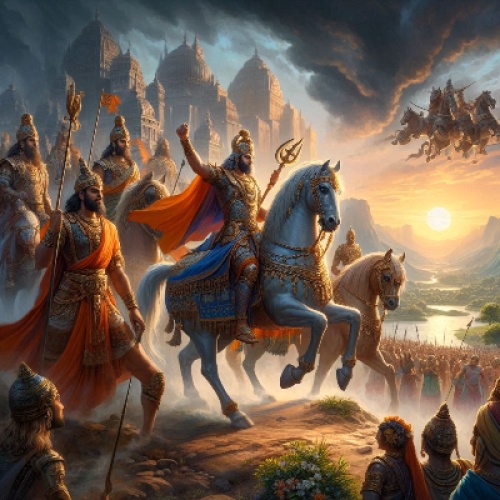But when King Aryan's mighty armies overran the kingdom, even the strength of Gautam's leadership couldn't prevent the inevitable fall. King Gautam Satya Sarathi was captured, and Aryan, with his usual ruthlessness, ordered the execution of all the leaders of the defeated kingdom. There would be no mercy for anyone who had been part of King Gautam's administration.
However, there was one exception: Acharya Srinivas, the humble and soft-spoken priest who had served as the king's most trusted advisor. Acharya Srinivas was a man of profound wisdom, known for his calm demeanor and quiet nature. The conquerors saw no threat in him, mistaking his quietness for weakness. Thinking he could do no harm, they spared his life but sent him to a remote and desolate prison, a place so far removed that no one could hope to reach him. They thought that by silencing the Acharya, they had effectively crushed all remnants of the kingdom's spirit.
The prison, nestled deep within a mountain range, was more a dungeon than a cell. The few prisoners who were confined there faced not only the physical bars but also intense mental anguish. The isolation drove many of them to the edge of madness. The guards were ruthless, and hope was a distant memory for most of the inmates.
But amidst the gloom and despair, Acharya Srinivas remained serene, even joyful. He walked the narrow corridors of the prison with a lightness in his step, his face always adorned with a smile. He would hum melodious tunes and spend his days in peaceful meditation. His calmness bewildered the other prisoners and guards alike.
One day, news reached King Aryan about this strange behavior. Curiosity got the better of him, and he decided to visit the prison to see this curious man for himself. The king, draped in his regal robes, arrived at the prison, flanked by his loyal guards. He expected to find a broken man, a prisoner crushed under the weight of captivity. Instead, he found Acharya Srinivas sitting cross-legged in the corner of his cell, singing softly to himself, his eyes closed in peace.
The king furrowed his brows, confused. "How can this man, imprisoned in such harsh conditions, be so content?" he wondered. He ordered the chief guard to open the cell.
Stepping inside, King Ayan addressed Acharya Srinivas. "How is it that you, a prisoner in this desolate place, remain so joyful? Does captivity not weigh upon you like it does on the others?"
Acharya Srinivas opened his eyes, smiling warmly at the king. "Your Majesty," he said softly, "captivity is of the mind, not of the body. You see me confined in this cell, but my spirit is free. True imprisonment is not in chains, but in the attachment to worldly things."
The king, perplexed, retorted, "Do you not miss the freedom you once had? Your power, your position, your comforts - are they not worth longing for?"
Acharya Srinivas shook his head. "Your Majesty, freedom is not found in power or in material possessions. True freedom is found within, in the ability to detach oneself from the desires and fears that bind the heart. You may imprison my body, but you cannot imprison my soul."
King Ayan was intrigued. He had conquered many lands, but never had he encountered a man like Acharya Srinivas. "You speak in riddles, priest," the king said. "Explain to me, if everyone is a prisoner of something, how can one truly be free?"
Acharya Srinivas rose slowly to his feet and walked towards the window of the cell, gazing at the distant mountains. "Your Majesty, everyone in this world is a prisoner in one way or another. You are imprisoned by your pride and ambition, always seeking more power, more control. Your guards are imprisoned by their duty and their fear of you. The prisoners here are chained by their anger and frustration, longing for freedom they think exists outside these walls. But I am free because I do not allow my circumstances to define my state of mind."
The king stood silent, absorbing the words. Acharya continued, "You see, Your Majesty, I have accepted my situation. I do not resist it, nor do I long for what I have lost. This acceptance is what frees me. When we are attached to outcomes or desires, we become enslaved by them. But when we let go of those attachments, we become truly free, no matter where we are."
King Aryan was shaken. Never before had he encountered such wisdom. For a moment, he felt as though the chains that bound him - the chains of pride, fear, and desire - had become visible, wrapping tightly around his heart. He realized that despite all his power, he was not truly free.
"Is there no escape from this imprisonment of the heart?" the king asked, almost pleadingly.
Acharya Srinivas smiled gently. "There is, Your Majesty. The path to freedom lies in self-awareness and detachment. By recognizing the things that bind us - our fears, our desires, our need for control - we can begin to loosen their grip on us. It is not an easy path, but it is the only one that leads to true liberation."
The king looked at the Acharya, a sense of respect growing in his heart. "You speak as though you are not a prisoner at all," Aryan said, his voice softening.
"In many ways, I am not," replied Acharya Srinivas. "Though my body is confined, my mind roams free. I have found peace in accepting what I cannot change and finding joy in the present moment. This is a freedom that no king, no army, can take from me."
For a long while, King Aryan stood in silence, contemplating the Acharya's words. When he finally spoke, his voice was tinged with humility. "You have shown me a truth I had not seen, Acharya. Perhaps I am the one who is truly imprisoned."
With that, King Aryan left the prison, but the conversation lingered in his mind. He found himself thinking deeply about the Acharya's words in the days that followed. Slowly, he began to change. He started to release his tight grip on power, ruling with more compassion and less fear. He realized that the true enemy had never been his conquered kingdoms, but the prison of his own pride.
Acharya Srinivas remained in the prison, but his wisdom spread far beyond the walls. The guards, inspired by his calm and peaceful nature, treated the prisoners more kindly. And the prisoners, in turn, began to find solace in their shared suffering, learning that even in the darkest of places, there could be light.
Moral of the Story:
1. True Freedom Lies Within: External circumstances do not determine our inner state of freedom. The key to true liberation is mastering our desires and attachments.
2. Acceptance is Power: Accepting what we cannot change frees us from the suffering of resistance, enabling us to find peace in any situation.
3. Wisdom Can Transform the World: The wisdom of a single individual can have a profound impact on those around them, even the most powerful and ruthless of rulers.








